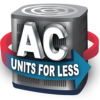10 Common Problems and answers for a cool and hiccup Free Summer !
Regular servicing of your HVAC system is crucial for maintaining its efficiency and longevity. Here’s a detailed guide on how often and why it's necessary to service your HVAC system.
Scheduled Inspections
Spring and Fall Check-Ups
Ensure your HVAC system is inspected by a professional contractor during the spring and fall. These inspections are timed to prepare your system for the demands of the upcoming cooling and heating seasons, ensuring components from the blower to the thermostat are functioning optimally. This proactive approach helps maintain comfortable temperatures in your home throughout the year.
Outdoor Unit Maintenance
Regular Cleaning
While a professional will handle the internal mechanics, homeowners should regularly check the outdoor unit every few weeks. Removing leaves, weeds, and debris is essential to prevent blockages that can impair performance and cause damage.
Understanding Air Ducts
Importance in Airflow
Air ducts are critical in circulating warm or cool air throughout your home. To ensure efficient airflow and air quality, ducts should be professionally cleaned, insulated, and sealed. Leaky ducts, especially in unfinished spaces like attics, basements, and crawl spaces, can significantly reduce your system's efficiency—by as much as 20 percent.
Thermostat Settings for Savings
Smart Usage
Properly setting and programming your thermostat prevents your HVAC system from overworking and can contribute to significant energy savings. An optimally used thermostat can save you up to $180 per year in energy costs.
Filter Maintenance
Regular Replacement
Filters should be changed every three months, or seasonally, for 1-inch filters. If your home has pets, smokers, or a high level of allergens, you may need to replace filters more frequently. Always check your system’s filter size(s) before purchasing replacements. According to Energy Star, changing your filter is a crucial DIY task for maintaining your HVAC system's efficiency, as a dirty filter can lead to increased energy costs and potentially cause early system failure. Plus, regularly replacing your filter contributes to better indoor air quality.
By adhering to these maintenance and care tips, you can ensure your HVAC system operates efficiently, providing comfortable temperatures and clean air in your home year-round.
BONUS
Ah, the sweet relief of cool air on a scorching summer day. But what happens when your trusty HVAC system throws a wrench in your comfort plans? Don't fret! Many common problems plaguing your cooling system have simple solutions, saving you money and frustration. Let's explore 10 frequent culprits and their fixes:
1. Clogged Air Filter:

- Problem: Imagine trying to breathe through a dust-filled mask. It's the same for your AC! Dirty air filters restrict airflow, making your system work harder, lowering efficiency, and potentially damaging components.
- Solution: Replace your air filter every 1-2 months during peak usage (more often if you have pets). Choose the right size and MERV rating for your system.
2. Frozen Evaporator Coil:

- Problem: This chilling issue occurs when low refrigerant levels or restricted airflow cause the coil to freeze, blocking further cooling.
- Solution: Turn off your AC immediately and call a professional for diagnosis and repair. Don't attempt to defrost it yourself, as improper methods can worsen the problem.
3. Refrigerant Leaks:

- Problem: Just like a flat tire, low refrigerant levels due to leaks reduce your AC's cooling capacity. This can also damage the compressor, leading to expensive repairs.
- Solution: Call a professional for leak detection and repair. Topping up refrigerant is only a temporary fix if there's a leak.
4. Faulty Thermostat:

- Problem: Is your thermostat stuck on "heat" while you're sweating buckets? A malfunctioning thermostat won't communicate properly with your AC, leading to inconsistent cooling.
- Solution: Replace the batteries first. If the issue persists, consider replacing the thermostat with a programmable one for better control and energy savings.
5. Dirty Condenser Coil:

- Problem: Think of your condenser coil as your AC's radiator. Dirt, leaves, and debris buildup hinder heat dissipation, reducing efficiency and increasing energy consumption.
- Solution: Turn off your AC and carefully clean the condenser coil with a soft brush and water hose. Be mindful not to bend the delicate fins.
6. Blocked Ducts:

- Problem: Just like clogged arteries restrict blood flow, blocked ducts prevent cool air from reaching your rooms, leading to uneven cooling and higher energy bills.
- Solution: Have your ducts professionally cleaned every 2-5 years, depending on your environment and usage.
7. Faulty Fan Motor:

- Problem: The indoor and outdoor fan motors circulate air throughout your system. If one fails, cooling won't be effective.
- Solution: Contact a professional for diagnosis and repair or replacement of the faulty motor.
8. Compressor Issues:

- Problem: The compressor is the heart of your AC, pumping refrigerant to create cool air. Its failure means no cooling at all.
- Solution: Unfortunately, compressor issues often require professional repair or replacement. Regular maintenance can help prevent premature compressor failure.
9. Ice Buildup on the Drain Line:

- Problem: If the condensate drain line clogs, excess moisture can't drain properly, leading to ice buildup around the evaporator coil and reduced cooling.
- Solution: Clear the drain line blockage (carefully!) and ensure it's properly sloped for drainage. Consider professional cleaning if the issue persists.
.  :
:
10 - Electrical Issues -
- Problem: Blown fuses, tripped breakers, or faulty wiring can disrupt power to your AC, leaving you hot and bothered.
- Solution: Check your breaker box first. If the issue persists, call a qualified electrician to diagnose and fix the electrical problem.
Remember: While some basic troubleshooting is possible, complex issues require professional attention. Regular maintenance can prevent many of these problems and ensure your cooling system operates efficiently and reliably for years to come. Stay cool and comfortable all summer long!
Bonus Tip: Consider smart thermostats! They offer remote control, scheduling, and learning capabilities to optimize your comfort and energy savings.


